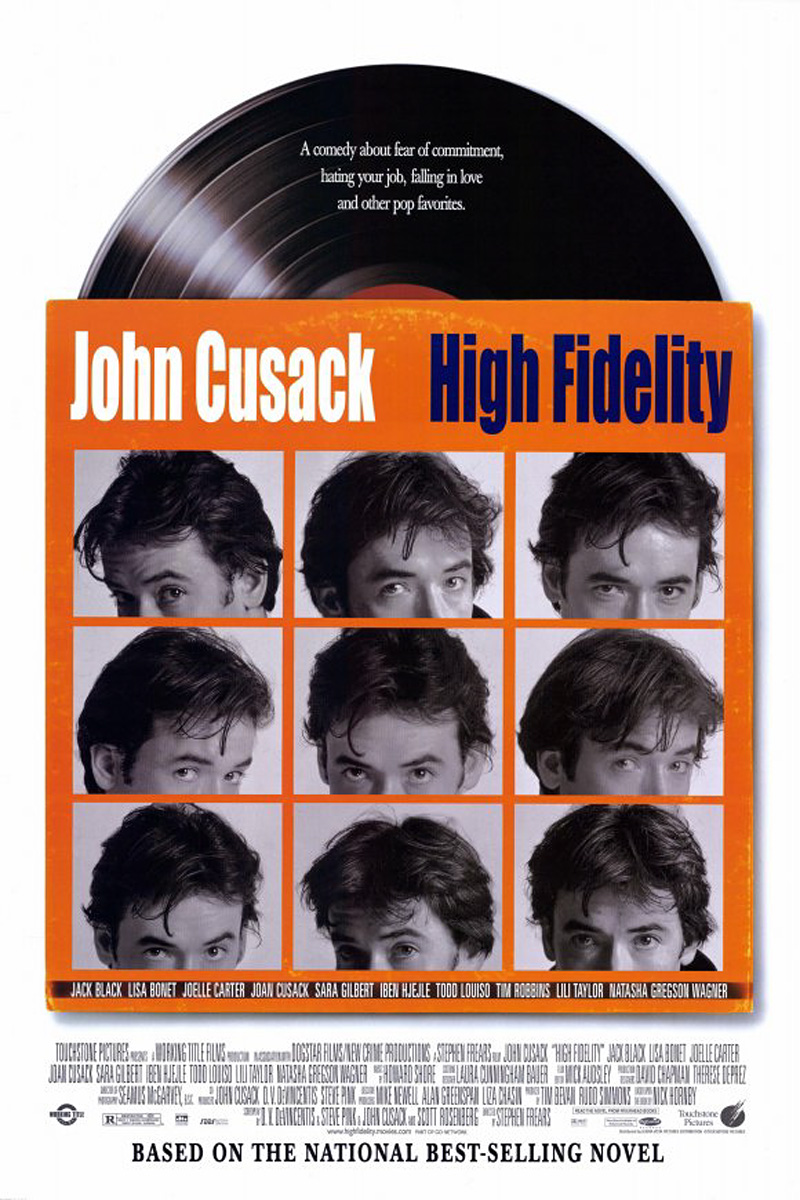“What came first, the music or the misery? People worry about kids playing with guns or watching violent videos…that some sort of culture of violence will take them over. Nobody worries about kids listening to thousands—literally thousands—of songs about heartbreak, rejection, pain, misery, and loss. Did I listen to pop music because I was miserable? Or was I miserable because I listened to pop music?”
Thus Rob Gordon (John Cusack) opens the 2000 movie High Fidelity, a two-hour rumination on love and indie rock based on Nick Hornby‘s 1995 novel. “You’re Gonna Miss Me” by ’60s cult psych-pop band 13th Floor Elevators floats from the turntable during the opening credits as the stage is set for a film that 10 years later is still easily one of the top five music films of all time, one that has inspired and spoken to a generation of romantic music nerds in all corners of the industry.
“I could really relate to John Cusack’s character,” says Mike Jaworski, former Sonic Boom manager and current owner of Mt. Fuji Records, speaking on the eve of the movie’s 10th anniversary—today, March 31. “It wasn’t just that the film was well-written and acted; I just related so much to the idea of music in relation to significant others. And of course the fact that his character works in a record store and then starts his own record label,” he laughs.
While technically a romantic comedy in most respects, much of the film’s emotional tone and timber comes from the dialogue that circulates at Championship Vinyl, the record store owned by Gordon which serves as the movie’s primary setting. While fumbling through girl problems and economic woes, Gordon and his employees/best friends (“the musical moron twins,” he affectionately calls them), Dick (Todd Louiso) and Barry (played with much caustic vigor by Jack Black), bond over obscure music knowledge and experience the subsequent intimacy that comes with making music your emotional center.
As someone who’s spent his share of time ruminating from behind the counter, Jaworski knows that center all too well. From 2003 to 2008, he ran the now-defunct Fremont branch of Sonic Boom records. And while he currently books bands for the Sunset Tavern in Ballard and tends bar part-time at Al’s Tavern in Wallingford, his primary labor of love is running Mt. Fuji Records. Much like Cusack’s character, who ends up starting a record label and putting out the debut record by a pair of hip-hopping hoodlums whose talents he unearths not long after he accosted them for shoplifting, Jaworski started releasing records by bands like the Whore Moans, Black Whales, and the Maldives as a direct result of his interactions at Sonic Boom.
“I became friends with [Maldives frontman] Jason [Dodson] through Sonic Boom,” he recalls while pulling a pint of Rainier beer at Al’s on a stormy Sunday night. “He’d come in and buy all these Smog and Bob Dylan records, and we just started talking. It was a slow-burning, organic process becoming friends with him through the record store.”
The occupational hazard of music snobbery, well-represented throughout High Fidelity, is also something he’ll cop to. “It’s hard not be judgmental. I’m as excited as the next 16-year-old girl to hear the next Justin Timberlake record, but at the same time if some teenager wanted to buy Insane Clown Posse, I’d say ‘No, you want Mclusky,'” he laughs.
Ann Powers, a veteran music journalist who cut her teeth at Seattle’s shuttered The Rocket and is currently the chief pop critic for the Los Angeles Times, worked at Tower Records’ flagship store in San Francisco in the mid-’80s. “I always say my years at Tower were my college education in pop,” says Powers, chatting via e-mail while attending the Big Ears festival in Knoxville, Tenn. “I had access to the widest possible range of music, and really explored everything from classical to jazz to metal. Even better was the staff of musically hyper-educated misfits who became like family.”
However, she doesn’t relate to much of High Fidelity’s male-centric perspective and orientation toward musical one-upmanship. “I remember liking the movie…on the basic ‘cute actors, good jokes’ level it is unbeatable. But I was never a list-maker,” she continues, referring to the characters’ fondness for continually generating lists (best songs about death; best songs to play on a Monday morning; top five track ones/side ones, etc.). “I find that aspect of music fanship intimidating, even still. In some ways reacting against the list-making, intellectually macho form of music fandom directed my whole approach to music writing. I became interested in the points of view that were not considered valid or ‘cool,’ and in understanding why one person or group identified with one kind of music and why another loved something else. The way music stimulated emotions and told hidden stories became more important to me than any idea of ‘good’ or ‘bad.'”
Ultimately, however, it’s clear that even the negative components of music snobbery are generated from a passionate place with good intentions. “Music is the biggest part of my identity,” says Jaworski. “Ever since I was old enough to have my own allowance, I would hang out in record stores. The day a new record would come out, I wanted it. Hell, I just love the way they smell.”








